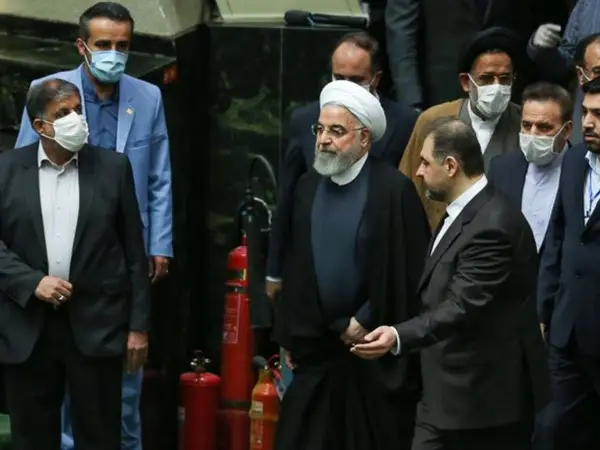Iranian parliament's investigation of former President Hassan Rouhani may be a factionally motivated move by hardliners to divert attention from his successor's failings.
The parliament Tuesday voted to investigate the performance of Rouhani’s government, with 138 in favor, 28 against and 10 abstentions particularly the presidential office.
"The Raisi government and the hardline parliament's failings in controlling inflation and forex rates in these past few months … they want to overshadow such failings with theatrical and demagogic moves," Professor Sadegh Zibakalam, an outspoken commentator, told Aftab News Thursday. The news website is believed to be close to the pro-Rouhani Moderation and Development Party.
"It's quite clear that the main aim of such plans is merely serving political and factional interests rather than securing national interests, service to the country, and fight against corruption," Zibakalam alleged but said the move to investigate the Rouhani administration's performance could be positive as it could motivate Rouhani to also speak out about the issues raised by lawmakers.
Rouhani's responses, Zibakalam said, would show whether it was his opponents' insistence on hostility toward the United States and the Islamic Republic's regional policies, which led lie to the current economic crises, as hardliners allege, or Rouhani's performance. "Sadly, I don't think Rouhani will ever respond to such moves."
Iran’s nuclear program and aggressive regional policies are the domain of Supreme Leader Ali Khamenei. Neither Rouhani nor Raisi can alter these policies which have led to various sanctions and consequent economic crisis.
Rouhani's hardliner opponents who accuse his men of mismanagement, squandering billions of dollars of hard currency and gold, have long been demanding that parliament should launch an investigation into the conduct of Chief of Staff Hossein Fereydoun, former Vice-President Mohammad Nahavandian, and other members of Rouhani's economic team.
Fereydoun -- Rouhani's younger brother, confidante, and chief of staff – was involved in the nuclear negotiation with world powers between 2013-2015 that led to the conclusion of the nuclear deal known as the Joint Comprehensive Plan of Action (JCPOA) in 2015. Hardliners say his "meddling" in the negotiations bore "damaging consequences". Fereydoun who took part in the talks on the president's behalf has also been accused of influencing the appointment of officials of economic institutions and banks for personal gain.
In 2017, then Chief Justice Ebrahim Raisi who was running against Rouhani accused the incumbent president of preventing corruption investigation of "someone very close to him" and provided enough clues in televised debates to make it clear that he meant Rouhani's brother. Fereydoun was arrested on charges of corruption in 2018. He was sentenced to five years in prison and a cash fine in 2019 for "receiving bribes". He has beenserving his sentence at Tehran's Evin Prison since October 2019 but denies all wrongdoing.
Also speaking to Aftab News, political analyst Mohammad-Sadegh Javadihesar said the parliament's move to probe Rouhani administration was a "political move to influence the media atmosphere" in favor of the Raisi administration by making his failings appear to be his predecessor’s fault.
Stating former Vice President Es'hagh Jahangiri's description of Rouhani as the regime's "chest of secrets", Aftab News said pressures may incite Rouhani and his men to respond to allegations and "disclose some truths about the problems and impediments behind the closed curtains" during his two terms of presidency.
